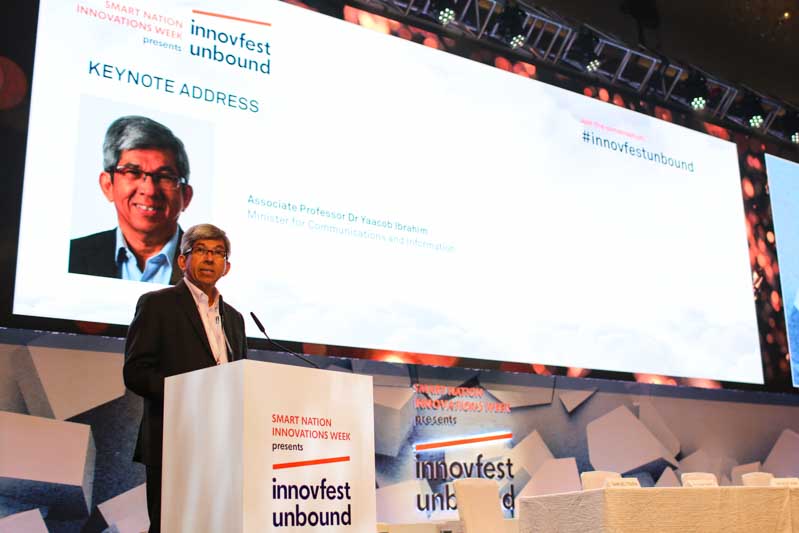
At his keynote address of Innofest Unbound 2017 (May 3-4 2017) as part of the Smart Nation Innovation Week, Minister Dr. Yaacob Ibrahim spoke about the importance of both public and private sectors working together to develop Singapore’s digital economy. He outlined three key thrusts of the Singapore government’s enhanced growth strategy for the digital economy.
Thrust 1: Invest in building frontier capabilities
During his Committees of Supply, or COS speech in March, Minister Ibrahim mentioned that the Singapore government will be increasing their investments on frontier technologies such as Artificial Intelligence (AI) and Data Science. AI has emerged due to a confluence of three factors: the availability of Big Data, advances in high-performance computing and the invention of new learning algorithms and architectures. The potential gains from an enabler technology like AI are massive. Minister Ibrahim announced the establishment of AI.SG, a new national programme to boost Singapore’s AI capabilities. AI.SG will be driven by a partnership comprising the National Research Foundation (NRF), Smart Nation and Digital Government Office (SNDGG) at the Prime Minister’s Office (PMO), Economic Development Board (EDB), Infocomm Media Development Authority (IMDA), SGInnovate, and the Integrated Health Information Systems (IHiS).
AI.SG will do three key things – One, address major challenges that affect society and industy, two, invest in deep capabilities to catch the next wave of scientific innovation, and three, grow AI innovation and adoption in companies, an initiative most pertinent to the business community. Three focus areas for AI.SG has been identified – finance, city management solutions and healthcare. NRF has also collaborated with the National University of Singapore (NUS), Nanyang Technological University (NTU), Singapore Management University (SMU), and the Agency for Science, Technology and Research (A*STAR), to set up the Singapore Data Science Consortium. The consortium will strengthen collaborative research linkages between Institutes of Higher Learning, research institutes and industry. This will help industry to adopt data science and analytics technologies to address real-world challenges.
Thrust 2: Support promising enterprises
The second thrust of the Singapore government is to help promising Singapore-based tech-product companies. Accreditation@IMDA, a key initiative launched in 2014, collaborates with SGInnovate and industry accelerators to provide customised assistance to high-growth start-ups and SMEs to accelerate their growth, and to internationalise through IE Singapore and Singapore’s enterprise partners. To date, Accreditation has accredited 17 companies. Accreditation will progressively establish key partners in various sectors to help accredited companies scale up more effectively. IMDA will partner with DBS, OCBC and UOB through the signing of individual Memorandum of Intents (MOIs), and accredited companies will be provided with increased access to innovative projects to build their track record in the banking sector.
The Singapore government will also continue to provide customised support for SMEs to seize opportunities in the digital economy. In Minister Ibrahim’s COS speech, he talked about how SMEs Go Digital will help SMEs’ overall level of digital readiness to help them at various stages of their digital transformation journey. To date, SMEs Go Digital has close to 50 pre-approved digital tech solutions that SMEs could tap on to innovate.
Thrust 3: Develop a pipeline of frontier tech talents
As Singapore enters into the digital economy, she will need to build a strong pipeline of tech talent with skills in frontier tech areas such as AI. A steady pipeline of quality tech talent is critical for businesses to break new frontiers in the digital economy, to grow and scale the businesses, especially as the time-to-market continues to shorten in the tech industry. At COS this year, Minister Ibrahim reiterated the importance of tech talent development when he spoke about the good work that IMDA’s TechSkills Accelerator, or TeSA, is doing. As part of the third thrust, TeSA will continue to equip the Singaporean workforce with tech skills for the digital economy. Beyond manpower, Singapore will continue to enhance other aspects of her ecosystem, including first-class connectivity infrastructure and a conducive regulatory environment, to support the innovation journey of all enterprises.
















